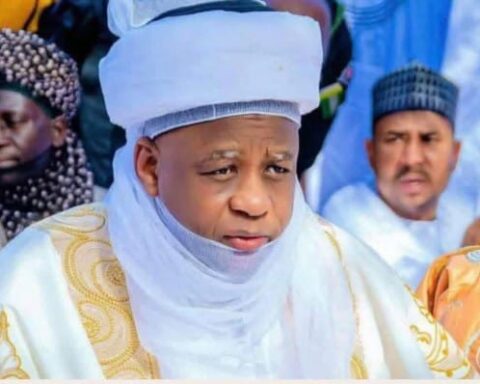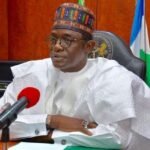The National Economic Council meeting chaired by Vice President Kashim Shettima has announced a new policy which kicked off Thursday (yesterday) October 31, allowing individuals to bring cash held outside the banking system into banks without penalties or taxes, provided the funds are not from illicit sources.
Minister of Finance and Coordinating Minister of Economy, Wale Edun, explained that the initiative is aimed at enhancing financial security and contributing positively to the economy by increasing reserves and stabilizing exchange rates.
He said: “I will end here by saying that clearly, one element of the cost increase is the foreign exchange rate, and that is demand and supply. There is going to be a release today, detailing by the federal government through the Ministry of Finance, in conjunction with the Central Bank, a programme, starting today, 31st of October, and lasting nine months, that will allow people to bring in cash that is outside the banking system.
“So, therefore, it is unsafe, it is insecure and it is outside of legal limits. They will be allowed forbearance to bring dollars cash. Let me emphasize once again, it is to bring dollars that they are holding outside the system to be able to bring them in and credit it to their bank accounts, as long as it is not proceeds of crime, illicit money. There will be no penalty, there will be no taxes, there will be no questions.
“They just meet the normal Know Your Customer criteria of banks and they have an opportunity to bring in those funds, make them safe, make them secure, and make them available through normal, economic activity.
“The details of that, the guidelines of that, will be released, first of all, the announcement by the Ministry of Finance and the guidelines later will follow very quickly by the Central Bank.
“That is an opportunity, not just for people who would normally like to comply, to be compliant with the laws and normal business practice, but of course, it gives us an opportunity to bring those dollars from where they are doing nothing to where they are within the financial system, they add to our reserves, and of course can help with the exchange rate.“
The Council also approved the “solutions for Internally Displaced and Host Communities” programme, presented by Hajara Ahmed, project coordinator for a World Bank-supported initiative.
The minister of Budget and National Planning, Atiku Bagudu, told newsmen that the initiative aims to address the long-term needs of internally displaced persons (IDPs) in Nigeria by improving access to basic services and economic opportunities.
The programme, he added, emphasizes investment in resilient infrastructure and support for host communities, recognizing that both groups require assistance to foster sustainable livelihoods.
Under the programme, States are expected to appoint focal persons to facilitate communication with the Federal Ministry of Budget and Economic Planning, which will oversee project implementation alongside the National North East Development Commission.
He said the first major goal of the programme is investment in resilient infrastructure. The initiative seeks to develop robust infrastructure that can withstand future challenges, including improvements in essential services such as water supply, sanitation, and transportation.
These enhancements, he said, are crucial for supporting both IDPs and the communities that host them.
In addition to infrastructure development, the programme, Bagudu added, emphasises the need for support for host communities. Recognizing that these communities face significant challenges, the initiative aims to provide necessary resources to help them to foster sustainable livelihoods.
By addressing the needs of host communities, the programme seeks to create an inclusive environment where both IDPs and local residents can thrive together.
Finally, the initiative focuses on strengthening project management and policy implementation. This involves enhancing the capabilities of local governments and community leaders to effectively manage resources and tailor interventions to meet the specific needs of both displaced populations and their hosts.
He assured that the programme would support the implementation of national policies related to internally displaced persons.
Meanwhile, NEC has called for the sustenance of the National Agency for Science and Engineering Infrastructure (NASENI), and the Tertiary Education Trust Fund (TETFUND), for the betterment of Nigerians.
Borno State Governor, Babagana Zulum who made the appeal while briefing State House Correspondents on Thursday at the end of the 144th NEC meeting, chaired by Vice President Kashim Shettima, at the Council Chamber, State House, Abuja, said the Council was impressed by the positive contributions of TETFUND to the growth and development of tertiary education across the country.
Adding that the Council endorsed the rationale behind the establishment of NASENI, as it has been fulfilling its mandate of reducing dependency on hydrocarbons in Nigeria, Zulum said: “Observations were also made on the positive contributions of TETFUND to the growth and development of education.
“Furthermore, observations were also made on the rationale behind the establishment of NASENI. That is the mandate of NASENI, which is to encourage production of local goods and services, thereby reducing dependency on hydrocarbons in Nigeria.
“The federal government of Nigeria and indeed the National Assembly, are encouraged and advised to sustain these two agencies for the betterment of Nigerians.”
He said Council also commended the efforts of the Nigerian Education Loan Fund (NELFUND) in supporting the education of less-privileged students.
Speaking on the concerns of NEC on the inconsistency of the National Social Register, Oyo State Governor, Seyi Makinde said the Council called for a social register that is devoid of politics.
“So what we’ve done with the social register, what we’re saying is, look, it will not be politicized, because when you see us play politics in the middle of the night we talk to ourselves.
“When it comes to governance it is a serious business, because the lives of millions of Nigerians are involved.
“Getting the correct social register devoid of politics is what we have tried to do,” Makinde stressed.



























